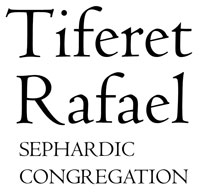Dear Congregants:
Our Parashah begins with the historic showdown between Yaakov and Esav. Yaakov is informed that Esav is heading his way with 400 people. The Pasuk says “And Yaakov became very frightened and it distressed him.” Obviously, if he is very frightened then he is distressed; why should the Pasuk mention both words i.e. Frightened and distressed ? Rashi explains that he was frightened of being killed and he was distressed about the possibility of having to kill others in self defense. So Yaakov prepared for this meeting in 3 ways: he prayed to HaShem for help, he sent a considerable gift to Esav to try to placate him and avoid war and finally he prepared for war by splitting up his family into 2 groups.
Rabbi Yehudah Berachah writes that he heard from Rabbi Yishak Kohen, the rav of the Shemuel Hanavi neighborhood in Israel, that there is an important lesson to learn from Yaakov’s dual anxiety at meeting Esav and his subsequent prayer. The lesson, says Rabbi Kohen is that anytime we are in a disagreement or a dispute with another party we should not only pray that we don’t get hurt but also that we don’t hurt the other party. In any dispute there is always a chance for things to get ugly. There could be Lashon Hara, Curses, monetary losses and ruined reputations. A person must know that if he comes out unscathed but the other party was unlawfully hurt then this will most definitely come back and bite him. HaShem runs the world measure for measure(*Midah Keneged Midah). The expression in English is “what goes around comes around.” All of the Jewish people are connected like limbs on the same body. By hurting someone else you are hurting yourself. Unfortunately, in a dispute, people are most concerned about protecting their own self interest i.e. money, reputation etc. If people only appreciated that they will be held accountable for improperly hurting the other party then they would be much more careful.
For example, says Rav Berachah, if after exhausting all possibilities a person is advised by a qualified sage that it is proper for him to get divorced then he should pray for a peaceful and equitable ending for both himself and his spouse. There is enough inherent pain and disappointment involved in divorce that one should pray to HaShem that he not inadvertently and unjustly add fuel to the fire and cause more damage than necessary to his spouse. A wrong word or a callous comment could cause immeasurable damage to the other party. This could be in the form of psychological scarring, a destroyed reputation or monetary losses.
In conclusion, we learn from our forefather Yaakov that in a dispute one should pray to HaShem that things should end well for both parties with no undue damage being caused to either party. It is also most appropriate and advisable to be in contact with a qualified Torah sage to determine the permissible course of action. A person should not act impulsively according to his own judgment. This will almost certainly result in a Halachically improper act which will cause undeserved and sometimes irrevocable harm to the other person. May HaShem bless all of us with sound advice, peace and tranquility among all the Jewish people, Amen.
Have a Shabbat Shalom.
